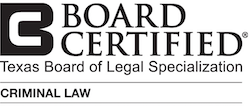Texas Evading Arrest Attorney
Evading Arrest is a charge that can come about from a particular situation when the accused, in a basic sense, is unaware that the police were attempting to detain them. There are a variety of reasons as to why this may occur. Perhaps the accused was not paying attention, or maybe they were hoping the police were actually attempting to follow someone else. A prime example of this might be if, in a non-motorized vehicle case, an officer began to shout at a group individuals who were standing at a corner of a known high-crime area, and some started to walk away as the officer was shouting at them for whatever reason he deemed to be necessary. It is often the case, when these types of situations happen, that individuals are charged with evading arrest or detention (with no additional charges, which is usually the case - i.e. charging an individual with Driving While Intoxicated, and also evading arrest, if the facts dictat that the individual tried to flee from the police officer after being "lit up" by the sirens and asked to pull over to the side of a roadway.
At any rate, in the former example, this situation may seem on its face to be particularly odd, because one would have to wonder if the group of individuals ultimately arrested for "Evading Arrest" actually knew they were attempting to be lawfully detained by the police officers. It would even stand to reason, it would seem, that they may not be on notice at all that the police officers were intending to apprehend any of them, and so it would obviously not be their intention to have engaged in "evading arrest" at all. At any rate, it is important to hire an aggressive, thorough, and experienced criminal defense aYou can contact the Law Offices of Carl David Ceder at anytime for assistance at 214.702.CARL(2275) or at 469.2000.DWI(394). Phones should be answered 24 hours a day/7 days a week for immediate and personal assistance.
Texas Evading Arrest or Detention Law
Texas Penal Code Section 38.034 states, in relevant part, the following:
(a) A person commits an offense if he intentionally flees from a person he knows is a peace officer attempting lawfully to arrest or detain him.
(b) An offense under this section is a Class B misdemeanor, except that the offense is:
(1) a state jail felony if the actor uses a vehicle while the actor is in flight and the actor has not been previously convicted under this section;
(2) a felony of the third degree if:
(A) the actor uses a vehicle while the actor is in flight and the actor has been previously convicted under this section; or
(B) another suffers serious bodily injury as a direct result of an attempt by the officer from whom the actor is fleeing to apprehend the actor while the actor is in flight; or
(3) a felony of the second degree if another suffers death as a direct result of an attempt by the officer from whom the actor is fleeing to apprehend the actor while the actor is in flight.
A person can be accused of committing the offense of Evading Arrest or Detention, if the a police officer believes the facts of the situation support that the accused intentionally fled from possible detention, when it is obviously know that they are a peace officer attempting to lawfully arrest or detain the individual. This criminal offense is considered a misdemeanor, unless the person has a prior conviction, and/or uses a vehicle in flight, in which case both would be charged and filed as a felony offense. The degree of a felony really depends upon whether or not the person used a vehicle and/or has been convicted previously of evading an arrest, whether a tire deflation device was used against the officer, whether anyone was injured, or if anyone died during the flight, or whether or not the person was a peace officer.
Fleeing or Attempting to Elude a Police Officer
Also, there is a separate criminal offense in Section 545.421 of the Texas Transportation Code, which states, in relevant part:
(a) A person commits an offense if the person operates a motor vehicle and wilfully fails or refuses to bring the vehicle to a stop or flees, or attempts to elude, a pursuing police vehicle when given a visual or audible signal to bring the vehicle to a stop.
(b) A signal under this section that is given by a police officer pursuing a vehicle may be by hand, voice, emergency light, or siren. The officer giving the signal must be in uniform and prominently display the officer's badge of office. The officer's vehicle must be appropriately marked as an official police vehicle.
(c) Except as provided by Subsection (d), an offense under this section is a Class B misdemeanor.
(d) An offense under this section is a Class A misdemeanor if the person, during the commission of the offense, recklessly engages in conduct that places another in imminent danger of serious bodily injury.
(e) A person is presumed to have recklessly engaged in conduct placing another in imminent danger of serious bodily injury under Subsection (d) if the person while intoxicated knowingly operated a motor vehicle during the commission of the offense. In this subsection, "intoxicated" has the meaning assigned by Section 49.01 of the Texas Penal Code.
According to the above referenced section of the Texas Penal Code, a person may be prosecuted under either, or both, of these statutes. A person who is alleged to have fled from the police will be charged with a felony offense of evading arrest, commonly referred to as "Evading with a Motor Vehicle." Whether the officer was lawfully attempting to arrest or detain the accused is frequently an issue in evading arrest cases and may be the subject of a Motion to Suppress.
Dallas-Fort Worth Evading Arrest Defense Attorney
No matter what the charge is or what is the circumstance, Dallas Attorney at the Law Offices of Carl David Ceder will fight for your rights, your liberty, and your freedom, regardless of the situation or the facts of your case. Please give us a call so we may be able to help you through this process and what can be a very difficult process to handle without proper representation. Contact an Texas Evading Arrest Attorney from the Law Offices of Carl David Ceder now. You can contact the Law Offices of Carl David Ceder at anytime for assistance at 214.702.CARL(2275) or at 469.2000.DWI(394). Phones should be answered 24 hours a day/7 days a week for immediate and personal assistance.




















